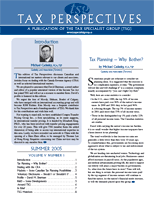
PDF Format
 Issue Contents Issue Contents
 All Issues All Issues
Summer 2005
Volume 5, Number 1
The information in Tax Perspectives is prepared for general interest only. Every effort has been made to ensure that the contents are accurate. However, professional advice should always be obtained before acting and TSG member firms cannot assume any liability for persons who act on the basis of information contained herein without professional advice.
Madeira — Some Canadian Tax Planning Possibilities
By Arnold Sherman, CA, CTA, TEP, FCA (England and Wales)
H. Arnold Sherman Professional Corporation (Calgary)
Where is Madeira? It is an island in the Atlantic Ocean, about 900 km south of Lisbon, off the coast of Morocco. Madeira (population — 250,000) is an integral part of Portugal — just as Newfoundland is an integral part of Canada. Madeira has its own corporate tax regime, separate from mainland Portugal, under which it is possible to pay no corporate tax until 2011. The double tax treaty between Canada and Portugal, effective in 2002, applies to Madeira. Because of that treaty, income from an active business carried on in Madeira by a subsidiary of a Canadian corporation will not be taxed when paid to the Canadian parent by way of dividends. A profitable Canadian manufacturing business transferred to Madeira has the potential to save a great deal of corporate tax. With an active business in Madeira, there will be no Portuguese tax, and no Canadian tax. Unlike some other low- and no-tax jurisdictions, Madeira has a skilled labour force and adequate infrastructure. Because of the high cost of shipping by sea, only products suitable for airfreight should be considered for manufacture or assembly in Madeira. Apart from the manufacturing possibilities, I have identified two other tax planning ideas for Canadians. The first is an actual case. Although it concerned an Italian manufacturing company, the same approach would be open to a Canadian manufacturer selling into the European Union ("EU"). An Italian parent company had set up a manufacturing facility in India. The product (electronic balances) was shipped to various countries in the EU. In each country, import duties were paid. The company arranged to air freight the components of the balances to Madeira, where they were assembled and shipped to EU countries free of duty. EU rules are that, provided some value has been added, there is no duty on shipments between EU countries. Portugal is, of course, an EU member. No Portuguese import duties were payable on components shipped into the Madeira free zone, where assembly took place. Duty savings more than offset the additional airfreight costs. Furthermore, to the extent that value was added in Madeira, an appropriate portion of the total profit could be allocated to Madeira, and would be exempt from all corporate taxation, as explained above. The second example relates to e-commerce. Under a Directive issued by the EU in 2000, companies based in a non-EU country, including Canada, doing business directly with the final customer in the EU, must include value-added tax (VAT) in their billing, at the rate applicable in the EU country to which the product was delivered. Products covered by the Directive include music, games, software etc., downloadable via the Internet. There are 25 EU countries, each with its own rate of VAT. The non-EU seller (such as a Canadian corporation) is required to calculate VAT for each country, collect it, and remit it to the country concerned. This is an almost impossible task, so there is widespread non-compliance. In a few years' time, the contingent liability of the sellers may be enormous, including interest and substantial penalties. Sooner or later, the guillotine will fall, and assessments will be raised. The US Internal Revenue Service has proven that tax authorities can get access to worldwide credit card information, which will be one way in which EU Governments will be able to obtain the information they need. Collection will probably not be a problem. EU countries will follow the lead of the US Patriot Act, which gives the US the right to retain funds from interbank and correspondent balances. Furthermore, more and more double tax treaties provide for assistance with collection. There is a solution! A Canadian selling company can set up a subsidiary in Madeira to be used as an invoicing company. Madeira VAT at 13% (the lowest rate in the EU) will be added to all invoices to the final consumer, unless the consumer is registered for VAT in their own country.Some management companies in Madeira are already providing this service to non-EU sellers. I have suggested several ways in which Canadian corporations can benefit from the tax status of Madeira. There are many others.
|